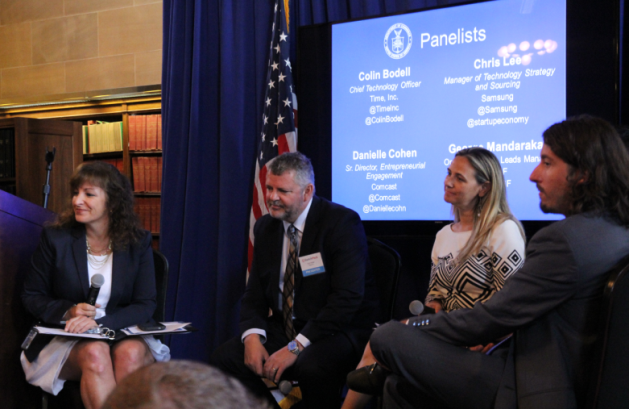Spotlight: U.S. EDA: Promoting Entrepreneurship and Innovation Across Every Community in America
November 2015 Newsletter

Entrepreneurship is a driving force in the new economy. While debates continue around whether entrepreneurs are born or can be created, one thing is clear: people learn a great deal from the experiences of others. Entrepreneurs especially learn a great deal “on the job” and often find inspiration and mentorship from those who have “been there, done that.”
As “America’s Innovation Agency,” the Department of Commerce focuses on supporting entrepreneurs and businesses of every size. For example, Commerce leads the Presidential Ambassadors for Global Entrepreneurship (PAGE) initiative, which works with celebrated American entrepreneurs to harness their energy, ideas, and experience to help develop the next generation of entrepreneurs both at home and abroad.
In an effort to foster local entrepreneurship and innovation, the Commerce Department’s Economic Development Administration (EDA) launched a new $10 million funding opportunity for the Regional Innovation Strategies (RIS) program which provides grants to state and local governments, non-profits, universities, and other organizations to help build capacity for entrepreneurs seeking to turn ideas into job creating companies, and to help young companies attract and obtain much-needed capital.
With President Obama declaring November “National Entrepreneurship Month” it makes sense to recognize the entrepreneurs among us. A new television show, “How I Made it In America” is coming to ABC 7 WJLA later this month and features Julie Lenzer, Director of EDA’s Office of Innovation and Entrepreneurship. The show, which you can catch a sneak peek here, provides an opportunity for entrepreneurs to share their story including their ups and down, inspirations and aspirations.
As a former entrepreneur herself, Lenzer recognizes the need for public and private partnership and sees promise in the innovation and diversity of thought occurring in the federal government. She sees the resources, such as the Regional Innovation Strategies initiative, as a catalyst for job creation, but is careful to add, “at the end of the day, we don’t create jobs. We create and support the environment around which jobs can be created, but it’s really up to the private sector to jump in and lend that additional support.”
Individuals and companies take varied paths to become successful and illustrates that there is no magic formula to follow in starting and growing a company. Hearing from other entrepreneurs about their journey, especially their failures and their low points, provides a sense of hope, camaraderie, and much-needed motivation to succeed in today’s competitive global market. Given the contribution of entrepreneurial companies to our ability to innovate, grow the economy and increase global competitiveness across the country, that’s good for all of us.
Successful strategies that attract and engage underrepresented populations throughout each community will be a critical element of the playbook, as will a national convening of people and organizations who build the capacities for innovation and entrepreneurship in their communities. This is what we are trying to do every day at the Department of Commerce and the U.S. Economic Development Administration.


